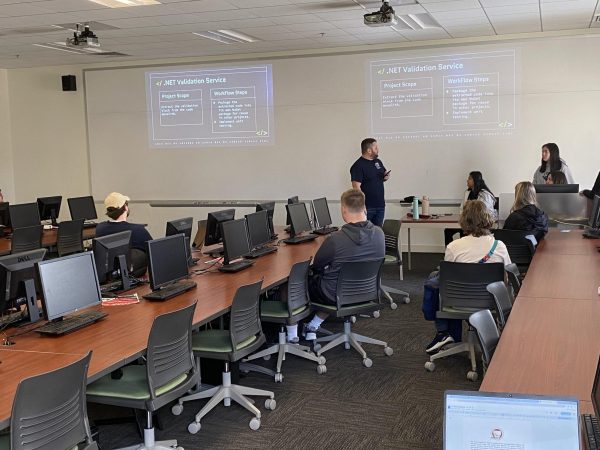Students face mental health hardships as semester winds down
October 29, 2019
Suicide rates are at an all-time high for U.S teens and young adults. and dealing with mental health has become one of the university’s main priorities.
Over 5,000 males and 1,225 females between the ages of 15 and 24 committed suicide in 2017. It is now the second leading cause of death for Americans between 10 and 34.
“Mental health has always been a challenge,” Director of the Counseling Center Thomas Longwell said. “You can be the most emotionally healthy person in the world, and life can come around and kick you in the butt a little bit.”
Students can go to the university’s Counseling Center when they are dealing with difficulties like transitioning to college, loneliness, unhealthy relationships, depression, anxiety and more.
One in four students have a diagnosable illness, according to bestcolleges.com. Forty percent don’t get help and 80% feel overwhelmed by their responsibilities such as school and work. Fifty percent have reported becoming so anxious they would struggle in school because of it.
The Counseling Center strongly encourages struggling students to go to them if they are in need of help.
“While we sometimes phrase this as a negative that students need help, I often phrase this as a positive in saying that people have always needed help, they’re just more likely to access it now,” Longwell said.
The university offers individual counseling, group counseling, couples counseling, substance use assessments, outreach, a relaxation room and consultation.
The Counseling Center is labeled as a “safe zone” for students of all ethnicities, abilities, religions, sexual orientations, physical appearances/sizes, and gender identities.
“When you’re not okay, it’s okay to get help,” Longwell said.
Junior Nursing major Olivia Akerele said that students can become so focused on everything around them, that they may not view mental health as a priority.
“I don’t think it’s a priority with students because they are so focused on wanting to get the grades, be involved on campus,” the Residential Assistant (RA) said.
She does believe that the university tries to make mental health a priority by organizing workshops for mental health and destressing. She said that most people don’t have the time for it though.
Akerele would say that as an RA, she hasn’t noticed anything mental health problems related to students, but has noticed a lot of stress among them. She said she notices students trying to manage their time with school and being involved on campus.
Akerele hadn’t really paid attention to the mental health issue before she became an RA. However, during her RA training, one of the main things that was stressed was being able to take care of themselves and having time to practice self-care.
“(The training stressed) being able to have that time for self-care and being able to reflect on our week, our month, and just having someone to talk to,” she said. “I think since I’ve become an RA, I’ve taken mental health to the next level. I make sure I’m doing okay, the people around me are doing okay, my residents, I try to check up on them as much as I can.”
Akerele said taking the time to take care of yourself can help improve mental health.
Sophomore Psychology major Jasmine Thorne is working on a proposal project about improvements she believes can be made to the Counseling Center.
Thorne said she doesn’t believe there are enough counselors.
“It makes it a lot harder to get in there quickly,” Thorne said. “I understand that they’re always open if the situation is urgent, but it takes incredibly long to get in there if you just want individual counseling.”
She believes the solutions to this would include more group counseling and the Center being open longer than 8 a.m. to 4:30 p.m. on weekdays.
Thorne realized that she needed to go to counseling recently and said never hurts to talk to someone even if you don’t have a mental illness.
She said she made the appointment in the middle of October and her appointment isn’t until the middle of November. She said the wait doesn’t make her feel good, and while she can go somewhere outside of campus, it is more convenient to go to the Counseling Center on campus.
“I know this is an issue for other people,” Thorne said.
She said she knows the university is working hard towards mental health.
“I think a lot of colleges are realizing there are students who have mental health issues or who could use counseling, just as a general benefit,” she said.
Talking about issues that are bothering students can help more than not. Counseling provides the chance for someone to brainstorm ways to move forward and emotional support that can help students get through their issues.
“It’s important for college kids to know that it’s okay to reach out and get help,” Thorne said. “I know it kind of has a stigma around it, but I feel like it’s necessary.”
Jenna Arington thinks that mental health is an extremely serious topic.
“People talk about it, but not in the way it needs to be talked about,” the junior social work major said. “We need to be having those bigger conversations and dig in deeper. We need to make it more serious than a joke.”
Arington said she hears jokes every day about mental health. She gets frustrated when people say that they’re anxious and describe it as a personality trait rather than a mental disorder.
During the first semester of her freshman year, she found she was more anxiety-prone and then the second semester, she was more prone to depression.
“I went through about of loneliness,” she said.
During this time, she tried to get more involved on campus. She tried to make study groups within her classes to make friends, but nothing seemed to work. She tried to deal with it on her own for a while, which ultimately made her depression worse.
“Now that I’ve been through all that, it’s kind of a balance,” she said. “Some days I’m more anxious and some days I’m more depressed, but I know how to handle it better.”
She said that it takes will power to get through it, but she does take mental health days when she needs it. During her mental health days, she practices self-care or even catches up on work to help with her stress.
“It’s okay to take a break,” Arington said.
Arington went to the Counseling Center her freshman year, but she doesn’t recommend it. She said she needed appointments once a week or every other week and she was told that couldn’t happen.
Arington said the counselor she was working with told her that they couldn’t help her.
“Hearing a counselor, someone who is supposed to be a safe person, say we can’t help you, that kind of was a big blow,” she said.
Arington is now going to a counseling center off-campus.
She said that the university tries to address mental health, but it needs to be more on a continuous basis. She said that it’s great that they bring in therapy dogs during finals week, but students aren’t just stressed during finals.
Some techniques to help cope with mental illness include deep breathing. Breathe in for five seconds, hold for three and then breathe out for seven.
There’s also a technique called “The Five Senses,” which is when a person can ground themselves by focusing on each sense.
Emotion awareness is another technique. Recognizing emotions and realizing there’s nothing wrong with feeling the way someone feels can help with their mental health as well.
















